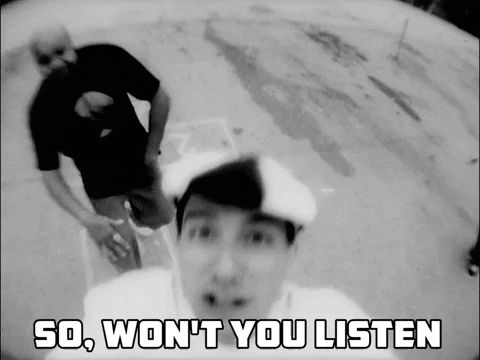25 October 2023 | People and Culture
Why are you such a bad listener?
By

Say it with me, “I am not a good listener.”
As a leader, lack of listening skills is a problem.
• Misunderstandings lead to broken trust
• When employees don’t feel heard, they are more resistant to change
• And a lack of understanding can lead to escalated conflict (Noo!!!!)
When you don’t understand your team, you make bad decisions.
🕶A lot of conflict can be avoided by simply taking the time to understand the situation before we respond.
Listening is a skill few people ever master or even take the time to learn about.
Here are the numbers:
While engaged in conversation, we’re preoccupied 75% of the time. Our minds wander like lost puppies who creep out the front door because your 8 year old son left the door open. Focus, people.
This leaves us with only 25% of the time to actually listen. Lol
And it gets better. Within an hour we remember less than 20% of what we actually heard.
Why are we like this?
But here’s the game-changer: less than 2% of people ever receive any sort of training on how to listen. Surprised?
But YOU, my friend, are on the brink of joining this elite club. Things are looking up for you right now because this edition of Leaders’ Len is your official formal training.
This is a BIG DEAL.
Today we are going to give you a framework that will help you develop trust, understand your team, and stop conflict before it starts.
Why? Because that’s what we freaking do out here.
We freaking help leaders like you be great.
Let’s freaking go.
The SIER-fire way to become a better listener
When things get stressful, you need to be at your best. This means resisting the urge to immediately respond and following a process.
A process to make you a better listener. A process you can literally implement in your next conversation.
I’m here for you.
S-ensing: More than just hearing, my friend. It’s the art of truly absorbing the verbal and non-verbal cues. You’re not just an audience but an active participant in the communication concert, attuned to the subtlest instruments in the orchestra of dialogue.
I-nterpreting: Here’s where your inner detective shines. You’re piecing together the puzzle, delving beyond the words, exploring the hidden map of emotions, context, and underlying messages. It’s Sherlock Holmes meets empathetic confidant.
E-valuating: Put on your analytical cap! You’re not jumping to conclusions but weighing the evidence, balancing facts with empathy, and checking biases at the door. It’s the judge’s chamber and the sanctuary of understanding, all in one.
R-esponding: The finale, the crescendo! Your response isn’t a reaction; it’s a carefully crafted reply, a bridge built on the pillars of comprehension and compassion. You’re the architect of resolution, designing responses that resonate harmony. It’s easy to skip directly to this step, but you must resist the urge!
And there you have it, the SIER method. Trust the process. Use the process. Become the process.
Nobody ever quit a job because they felt their manager was TOO good of a listener.
But how??
Let’s get tactical here and look at how you execute on each step.
Sensing:
This initial step is about hearing more than just the words being said. To do this well you need to be fully engaged and in the moment. You’re tuning in to not only words but also the non-verbal cues and emotions that are part of the message. It’s the foundation of effective listening. By paying attention to the voice, tone, and shifts in body language, you’ll be able to better absorb what is being shared and understand the intentions of your team.
Interpreting:
Once you’ve captured the message in its raw form, it’s time to process.
Pro Tip: Ask clarifying questions.
In this stage you are taking everything you learned in the sensing stage and making sense of it. You’re piecing together the verbal and non-verbal elements to create a more clear picture of what is going on. It’s about empathy and stepping into the shoes of the other person, but don’t forget there is more than side to a story. 🐸☕️
Evaluating:
Now it is starting to get real. This step is important.
With a clear image of the speaker’s message, you have to objectively analyze the information.
This is where your critical thinking skills come to life and you assess the message without bias or judgment. This is harder than it sounds because we all have biases.
You’re weighing the facts, separating opinion from truth, and considering the message in the context of what you already know.
Challenge yourself to take a moment to pause and reflect before moving into the next step.
Responding:
If you skipped the first three steps and jumped here:
• Do not pass go
• Do not collect $200
Here you are not reacting. You are being thoughtful in how you reply. It is impossible to do this well if you skip the first 3 steps, and that is why it is so important.
This is where you shine as a leader.
Your job is to close the communication loop, fostering a deeper connection and understanding between you and the speaker.
In Conclusion
How often do we think about what it means to be an effective listener?
For most people, never.
Remember each conversation is an opportunity to grow closer to your team, build trust, and potentially help prevent a conflict before it starts.
As a leader, you can’t become an observer.
You got this!